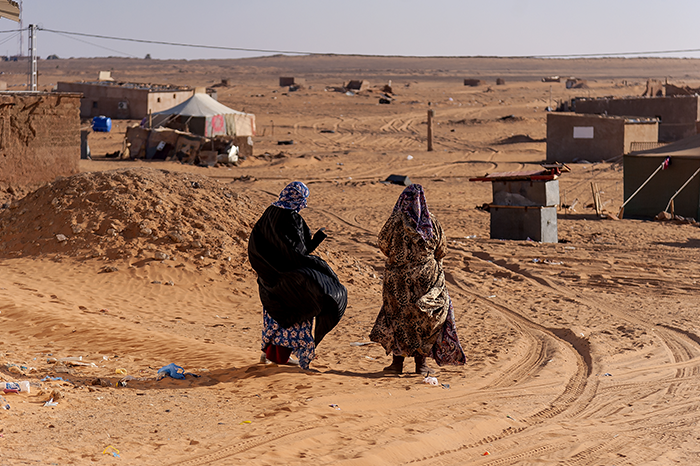Interviews / Observatory of the Maghreb
27 May 2024
Algeria: A Toughening Migration Policy?

Due to its strategic position, Algeria lies at the heart of migration flows extending from the Sahel to Europe. At the beginning of 2024, Algiers expelled nearly 2,000 migrants from sub-Saharan Africa to Niger. Meanwhile, the deteriorating political situation in the Sahel further complicates migration issues for Maghreb states, particularly for Algeria, which is not party to any agreement with the European Union (EU) to curb transit flows towards the Mediterranean.
What is the current state of Algeria’s migration policy, and what are its key challenges? How does Algeria coordinate its migration strategy with its neighbours? Insights from Brahim Oumansour, associate researcher at IRIS and director of the Maghreb Observatory.
At the crossroads between sub-Saharan Africa and Europe, Algeria stands at the centre of international migration flows, particularly in the wake of successive coups in the Sahel region. How is the government addressing the migration issue, and how is the country shaping its migration policy in this context of crisis in the Sahel?
At the crossroads of sub-Saharan Africa and Europe, Algeria has become a transit country for sub-Saharan migrants attempting to reach Europe, like the rest of North African states. Over the past decade, the country has witnessed the arrival of several thousand sub-Saharan migrants. As the largest country in Africa, Algeria shares borders with six nations—Tunisia, Libya, Niger, Mali, Mauritania, and Morocco—as well as the autonomous territory of Western Sahara. These borders are marked by inter-state tensions or state instability, necessitating active mobilisation of the Algerian army. The military has heightened its vigilance to counter multiple threats, including terrorism and various forms of trafficking.
Algeria’s migration policy currently faces major challenges, exacerbated by the crisis in the Sahel, which has intensified regional tensions and security threats, particularly following recent coups in Mali and Niger. In response to increasing migration flows, Algiers has adopted a dual approach, combining repressive measures with diplomatic cooperation, particularly with Sahelian states such as Mali and Niger. However, this cooperation has been shaken by the surge in migration flows and the emergence of new leadership in its southern neighbours.
Algeria has tightened its migration policy by intensifying deportations and expulsions of sub-Saharan migrants to the Sahara, near the border with Niger. The organisation Alarme Phone Sahara recorded approximately 26,000 expulsions in 2023. These measures have triggered diplomatic tensions, notably with Niger, which summoned the Algerian ambassador on April 3 to express its discontent. The recent decision by Niger’s leadership to terminate cooperation with the EU on migration policy is likely to increase pressure on Algeria and strain its relations with Niger.
Moreover, these mass expulsions have led to a dire humanitarian situation. Regularly, expelled migrants find themselves stranded at the borders in a desert region with scarce resources, while reception centres—such as the one in Assamaka, near the Algerian-Nigerien border—are overwhelmed. As a result, the large-scale expulsion of migrants has drawn criticism from NGOs and international human rights organisations, particularly as Algeria is a signatory to the 1951 Refugee Convention and the African Charter on Human and Peoples’ Rights.
At the regional level, to what extent does Algiers coordinate its migration policy with its Tunisian and Libyan neighbours and with NGOs on the ground?
First and foremost, work within the Arab Maghreb Union (UMA) is completely frozen, primarily due to tensions between Algeria and Morocco, fuelled by the Western Sahara conflict, which led to a diplomatic breakdown in summer 2021. In the absence of a common regional policy, each Maghreb state handles migration independently, relying on its own resources.
Despite relatively good relations, cooperation between Algeria, Libya, and Tunisia remains limited in terms of migration policy. The deportation of migrants to a neighbouring country has often been a source of diplomatic tensions. A tripartite meeting took place on 22 April between Algerian President Abdelmadjid Tebboune, Tunisian President Kaïs Saïed, and Mohamed Younes El-Menfi, President of the Libyan Presidential Council. The objective was to strengthen cooperation and establish joint commissions, with migration policy among the key issues under discussion.
Regarding NGOs, Algeria allows the presence of only a few international humanitarian organisations on its territory. Organisations such as Oxfam and Triangle Génération Humanitaire operate mainly in support of Sahrawi refugees in Tindouf, in southwestern Algeria, in collaboration with the United Nations High Commissioner for Refugees (UNHCR).
This limited presence reflects the Algerian authorities’ distrust of international NGOs, which are often accused of interference in internal affairs. It also highlights the delicate balance between national security and sovereignty, which the Algerian government prioritises, and compliance with international humanitarian law.
Does Algeria receive funding from the European Union as part of its migration policy? If so, to what extent and for what purposes?
The European Union has signed bilateral partnerships with Tunisia, Mauritania, and Egypt since July 2023. These migration agreements are designed to help countries of origin or transit strengthen border controls and prevent migrants from reaching European soil, in exchange for direct financial aid, investments, or economic development support. Brussels aims to expand this approach to other African countries.
However, no such agreement has been signed with Algeria. Unlike its Moroccan and Tunisian neighbours, Algeria does not receive EU funds for managing migration flows. It is unlikely that Algerian leaders would accept such an agreement for at least two key reasons.
Firstly, thanks to its gas and oil revenues, Algeria has little need for financial support, especially given the rise in energy prices over the past two years. Secondly, Algeria’s strong stance on national sovereignty makes its leaders reluctant to accept agreements that could be perceived as a sign of weakness, particularly for a state that has long emphasised its independence and regional influence.
It is also important to note that irregular Algerian emigration has significantly decreased. The primary issue in discussions with the European Union is now the transit of sub-Saharan migrants through Algeria towards Europe. This makes Algeria less inclined to engage, as it sees itself as less directly affected.
Ultimately, the EU’s strategy of outsourcing migration management to African countries appears to have reached its limits. The policy shift in Niger and the humanitarian crisis facing migrants stranded at the borders of several Maghreb and Sahel countries demonstrate that European policies have merely shifted the problem further south, leading to humanitarian and diplomatic consequences. A multilateral agreement between the EU and the African Union, for instance, would certainly be a longer and more complex process but could prove more effective in addressing this phenomenon.

